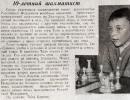Search with metal detector on the banks of the rivers. They are full of unexpected finds, landmarks. What equipment is needed to search for coins
We all love to swim, this is a fact, and we look forward to when the July Sun warms the water so that you can swim and sunbathe. What do you think, in the old days the people were bought? Or just worked to survive? I think the answer is obvious - our great-grandfathers and great-grandmothers are also, as we, loved to buy. Therefore, on such places you can always find something interesting with the metal detector. Therefore, let's talk about a few more places where you can walk with MD and pull coins.
Ponds - rivers, lakes and ponds.
Any village has always been disposed of any reservoir. Therefore, if you break through the ancient village, look for this very reservoir - it can be a river, and maybe a lake or a pond. Of course, for many years, the pond could dry, wash the river, so if there is an opportunity to use an old map, make it and install where the river flowed or was a pond.

Well, then you can start the search. Coins, as a rule, were most often lost on the elevated places where the people undressed, where the clothes remained. Therefore, if you got a bars next to the village, then think where there was an entry into the water, and where the people "searched". On the location of "Ledski" and pierce the detector, the finds will be one hundred percent. Of course, if the village is not old, then a lot of Soviet coins and other losses will come across. However, sometimes it is possible to hide quite interesting things. Here on such a swamp also managed to raise a pair of coins.

That we had a medal, not military, but for merit, I don't remember exactly now, something like work. Plus, once found as much as 7 pieces of Soviet coins and a half-jammed paper Soviet ruble. Remember it? Orange such. Look, he dropped someone's wallet, he rotted, and the money remained)) it was very cool to dig a few blind coins at once. Let them not stand anything, but we are not for the sake of profit with the coupe, but for the sake of adrenaline and pleasure.
Next - another place where we managed to "think about" are streams and crossings. In the streams, there is a lot of interesting things hidden. Judge yourself - there is a ravine, in the spring of melting water flows over it and flips out of the ground everything is there. And if the ravine is on the edge of the smelling field, then a lot of things can be raised in the stream. I remember, somehow, lasting a completely shallow stream, just our eyes found 3 coins. And the metal detector two more))
What can I find on the old beach at all?
First of all, it is of course coins, often come across buttons, badges, medals, crosses, rings and other decorations. All that you yourself can lose on the beach. It is unlikely that you will find the dishes and other items that can be found on the groceries and next to the houses.
And of course, the old beach can be attributed to the places of bathing, if so, can be found. We were lucky, just next to my house, where I was born (now I don't live there), there was a dilapidated village, judging by the houses of the year, the end of the 18th century. Powerful vintage houses from red bricks with meter walls - such houses time is still, as it seems to me. They have been standing for more than 100 years and will easily preserve as much as much.
Well, in front of this village, the river flows and there is a huge sandy beach. Even 50 years ago, as the grandmother told me, they went there to swim there, and this place was shown by their parents. So you can estimate that this beach has been there for a long time, the river bed has not changed 70 years at least. That is, on the place of the time of the centuries was the beach. And we, waiting for late autumn, when the water level is low, and there are no people there, they rushed there.
Fasteners were a bit, but it was steep searches. It all started with the fact that I raised the silver ring for the first time in my life, it is immediately clear that it is old. Looking later on the sample, I saw a girl in Kokoshnik - as it turned out, this testing as a time means that silver is old. Nakhodka I was very happy.
My buddy began to raise just tons of modern little things, after all, this beach also enjoys the modern population and "littered" him decently. Corks from vodka (who in the heat is at all drinking vodka?), From beer, labels from Coca-Cola and other effervescent drinks, there are banks from them. The whole modern trash Soon we have less learned to cut off, but sometimes they dug out the familiar "trash can" signal, for they knew that gold sometimes sounds exactly as a traffic jam or some more crap.
By the way, you can - what can I find and where it is better to look for.
We wandered the beach for a couple of days and at the end of the second day we began to come across the vintage coins - a penny of Nicholas II, most of the coins of that era. Doubles and even treshki. As we thought, we initially have defined a little wrong, but it is not surprising, for so many years, the relief of the locality changes. But the fact of us pleased - we found an ancient beach and hanged him a bit. Found with a dozen copper coins and it was cool.
Based on the thing described, you can draw conclusions where there is a chance to raise coins besides vintage roads and gardens on an abandoned village:
- Speak the area near the reservoir, try to find "lying"
- If the terrain is more loosted, then sow at the bottom of the ravine in the streams (if you look for spring, streams hundred pounds will be)
- If there is a river - it means there must be a place where the people are angry - looking for an ancient sandy beach
- The dried pond - in the spring, of course, there will be a chacha in such a place, but in the summer there you can try to search, the corrades have unsubscribed to me that the findings were, and the coins of the royal, vintage.
And therefore should not be neglected with such public places. Of course, in the center of the village more interesting, but suddenly there will be nothing to come across? Then immediately run the heads to the reservoirs and start searching on the shores. Well, good luck on the kopecks, corrades.
Rivers, rivers, streams, lakes and any natural reservoirs, this place, at the moment, is extremely interesting to search with the metal detector, and not at all because few people know about the real opportunity to find something interesting on their shores. Just most seekers focuses on the search, in some well-known, "Khabaronic" to define places. This is me about the marins, bridges, or where they are, when they were, crossing, mills, etc. Yes, both mainly are investigated by cities or major settlements. But the search on the shores of the reservoirs can be significantly expanded, unless of course sorry for this time and strength. One of the "old old" kopa, when it pushed me to try to try a kind, although the search type of time would try. So, we find a small river, but this on which a certain number of settlements was concentrated, not some significant, but just small villagers. We build your route in such a way that to explore the banks of the river for a distance to a kilometer from the settlement, well, or less, in general, as far as the strength and patience, up and downstream.  Of course, if you are interested in the Middle Ages, then all the "suspicious" places falling along the way, in a similar way, are checked. Preliminary work with media is certainly welcome. But you can rely on your intuition and try to go to your free search, it all is still based on some historical prerequisites. It is in such a free search, without any thorough preliminary work I came across the first, as a river bank researcher, scales of scales.
Of course, if you are interested in the Middle Ages, then all the "suspicious" places falling along the way, in a similar way, are checked. Preliminary work with media is certainly welcome. But you can rely on your intuition and try to go to your free search, it all is still based on some historical prerequisites. It is in such a free search, without any thorough preliminary work I came across the first, as a river bank researcher, scales of scales.  Saw a couple of hours with PGM and modern cards, and went on the road. Preparation for exit, practically no. Of course, someone will say, such a search does not justify itself, it takes too much time and strength, and the result is not predictable, and just doubtful. On the one hand, it seems that yes, nevertheless directly in the places where people lived and the losses more and hid more often. But here it depends on a person. I, for example, more interesting to diversify my departures to a cop, besides, and the traces of the colleagues of competitors are much less and more rapidly. And on the treasures generally a controversial question! No wonder experienced people say - do not calculate the treasies! Friends of themselves are later trying to fit their random find, under some system. The lifting of the treasure is the case of good luck, and even direct dependence on the number of hours spent on the speech, with the exception of rare lucky luck.
Saw a couple of hours with PGM and modern cards, and went on the road. Preparation for exit, practically no. Of course, someone will say, such a search does not justify itself, it takes too much time and strength, and the result is not predictable, and just doubtful. On the one hand, it seems that yes, nevertheless directly in the places where people lived and the losses more and hid more often. But here it depends on a person. I, for example, more interesting to diversify my departures to a cop, besides, and the traces of the colleagues of competitors are much less and more rapidly. And on the treasures generally a controversial question! No wonder experienced people say - do not calculate the treasies! Friends of themselves are later trying to fit their random find, under some system. The lifting of the treasure is the case of good luck, and even direct dependence on the number of hours spent on the speech, with the exception of rare lucky luck.
 One important moment! The shores of those rivers for which large, ancient trading paths are usually saturated with places deposited in the lists of protected objects. And in today's situation, it is impossible in any way in any way. We also consider the same thing that most of these monuments have not been noted on the ground, and not one generation of adventure seekers passed in places of the greatest availability, along well-known trade routes.
One important moment! The shores of those rivers for which large, ancient trading paths are usually saturated with places deposited in the lists of protected objects. And in today's situation, it is impossible in any way in any way. We also consider the same thing that most of these monuments have not been noted on the ground, and not one generation of adventure seekers passed in places of the greatest availability, along well-known trade routes.
 The volume of search tasks on the rivers is quite large. It should be remembered, the river in the old days was often the only means of the message between settlements. The roads were not attended far from everywhere, and simply there was no other possibility of delivery of goods except in winter in ice, but in summer water. So there were places of parking, and in the warm time of the year there are also crossings. So there is no need to catch your luck exclusively according to the well-known, large river trading paths. After all, people across the vast territory of the country communicated and transported cargo through rivers and rivers. Another example concerning search on the banks of rivers and lakes. It is well known, the greatest number of finds where the trade was going, where people were going, having fun, in general, where the life was burst. The fairs are very indicative in this sense, unfortunately, for the day today, find the fair has not yet knocked out with mellovels - the rare luck.
The volume of search tasks on the rivers is quite large. It should be remembered, the river in the old days was often the only means of the message between settlements. The roads were not attended far from everywhere, and simply there was no other possibility of delivery of goods except in winter in ice, but in summer water. So there were places of parking, and in the warm time of the year there are also crossings. So there is no need to catch your luck exclusively according to the well-known, large river trading paths. After all, people across the vast territory of the country communicated and transported cargo through rivers and rivers. Another example concerning search on the banks of rivers and lakes. It is well known, the greatest number of finds where the trade was going, where people were going, having fun, in general, where the life was burst. The fairs are very indicative in this sense, unfortunately, for the day today, find the fair has not yet knocked out with mellovels - the rare luck.  But where are the places where at the end of the 18th century, and even more so in the 19th, residents of cities and towns rested, not so difficult. Information is plentiful and not all such a place now in the city. Country picnones, etc., were popular, and traveled, for the most part, the same "Polyany". Such information is usually not difficult to find in urban libraries, for example in the 19th century newspapers or in a variety of descriptions of urban life of the end of the 18th century. And walks on steamers and walking ship in 19-20 centuries? After all, it is known that sometimes adorned to the shore for the inspection of beauty and attractions, and of course the same picnics in the fresh air.
But where are the places where at the end of the 18th century, and even more so in the 19th, residents of cities and towns rested, not so difficult. Information is plentiful and not all such a place now in the city. Country picnones, etc., were popular, and traveled, for the most part, the same "Polyany". Such information is usually not difficult to find in urban libraries, for example in the 19th century newspapers or in a variety of descriptions of urban life of the end of the 18th century. And walks on steamers and walking ship in 19-20 centuries? After all, it is known that sometimes adorned to the shore for the inspection of beauty and attractions, and of course the same picnics in the fresh air.
Taking into account what number of people is passionate about the instrument search now, it is very helpful to sometimes go beyond the usual sort of - on the old map of the village (racing, mill, etc.) is, and there are no twentieth on the cards of the century.
 Well, if you are lucky enough to find an interesting place on the shore of the lake, you are doubly lucky. Still, river beaches in spring in the flood are updated annually, much interesting disappears in the river. Here on the shore of the lakes and ponds, the finds sometimes dig for decades, or even in centuries. I have been used to search for such curious corners. An ordinary guidebook, pre-revolutionary year of release, of course.
Well, if you are lucky enough to find an interesting place on the shore of the lake, you are doubly lucky. Still, river beaches in spring in the flood are updated annually, much interesting disappears in the river. Here on the shore of the lakes and ponds, the finds sometimes dig for decades, or even in centuries. I have been used to search for such curious corners. An ordinary guidebook, pre-revolutionary year of release, of course.
Probably, it makes no sense to describe the pier, ships unloading sites, bridges, ferry crossings and many others are as obvious, in the sense of prospects, space for working with a metal detector. True, as I had to hear about a fairly successful search, after the landfit was worked in the pier. In the "Dump", they had a scale of coins on them, but it is rather a special case. In the search, I prefer to rely on myself, which I wish.
I do not know all the details of the incident, which led to the fact that the full-flowing river in my village has turned into a thin racing stream. Due to the lack of water, the shores were denied her clock, and the rod showed stones and shells.
This incident upset fishermen, and holidaymakers, which in the summer period on the banks of the river are at least eliminating. To whom sadness, and to whom and joy. After all, it always for happiness for happiness for happiness for a trendler. Places that have not seen a person with a detector and a shovel will bring interesting findings even to the seeker who will look for inexpensive Chinese metal detector.
The diggers divorced so much that the local population was already accustomed to a person with a metal detector in his hands and therefore did not react to them. Is that in rare cases asked whether there was a lot of gold and hearing laughter in response, the ravisses go. So it is not at all surprising that after only one month and or orst shores were the lunar landscape.
Features of the Cop on the bottom of the river.
I myself was wildly curious: what can be found on the metal detector.

In the evening, she walked ashore and, entering into the water by the ankle, led his search until the night was on.

To search for shakes without a scuba, the pinpointer becomes replaceable. My Pointer from Marsmd coped with such a cop.
I tried to look for different devices and with different coils, but the result was always almost one - scrap metal and a couple of tips.
The reader, I never thought that the river could be such a frank landfill - every centimeter of wiring coil, and sometimes only a millimeter and heard the signal from iron. If the detector, then or wire, or a plug, or the bottom of the canon can be spoken by color response. Less as: foil, jars with stainless metal and batteries.

Such Assorted Paval is not alone - on the shores all the dull garbage finds were lying. But the river, on the shores of which many centuries there is a settlement, should hide something more substantial in its depths, and not just trash! But, alas, all the vintage artifacts are buried under the thick layer of the abandoned Soviet era.
Then the diggers and I am among them, began to look only on the beaches. More than once I watched the guys of the corporate sand and after some time leaving the search. And all because those beaches on which they still bathe, I converted a few years ago with Camrad.
And I dig in advance on those shores where there were sometimes beaches. I remember them from your childhood, but now these places came down with Russian, and the bottom was tightened with her.

What amazing: every other coil on the same place, sniffed some kind of find. This is not surprising - after all, the little Nelm Sharpe collected superficial goals, the round staff of Aka saw Kakchto herself, but the 3rd frequency tornado felt the goals on perfectly, but in the places of abundance of iron blind as Mole.

Also from the finds on the edge of the seats of the former bathing come across all sorts of fishing gear: brilliantly, dracia, fabric, lead sore.

Abandoned little beaches are full, but I managed to knock out only two. On the second, also not noticed by other diggers, one after the other was popped up lately and modern coins.

If it were not for the abundance of garbage, then spending time with the metal detector for the bottom of the river would be much more interesting.
Another important moment of the river corop.
Rock beaches, do not forget about the trails that went to the places of swimming. I can only guess about the level of the corporal experience of the cams, who shared with detectors along the bottom of the river, as the trails remained virgin. Take out of the hidden shores of the dried banks and the swarm at least something interesting. After all, it is always nice to dig a coin, even if she was lost relatively recently. Agree?
My modest result.
Each time, when I brought discovery from the corop along a slosure river, then folded them into one bag. And so, when the water in the river returned to the usual level, coins and a "jeweler" from the package, to show his modest result to his reader.
Many river reservoirs and lakes hide a large number of treasures. Just imagine how much the people in all the time of the money circulation betrayed their values \u200b\u200bof water, who are specifically, and who is completely accidental.
For treasurers, this is a special search line, requiring special knowledge and skill.
We will now not affect those treasteners who dive in special equipment with scuba in search of sunken ships.
Consider a search that does not require expensive underwater equipment, but only requires a lot of desire, diligence.

"Fish" places for the presence of treasures are the ruins of old mills and old bridges. Almost any start of the beginning of the 20th century has marked these places. Having studied the card, you should be well focused on the ground and be accepted for the search. For the landmarks you can serve in overgrown and abandoned foundations of mills or old piles, protruding from water, testifying to the early presence of a bridge here.
Believe me, these places have seen many people in their century. It was randomly lost a large number of coins, and such places served as an excellent landmark for the burial of the treasure. The main task of the folder of treasures is to search for these coins, both in water and on the shore.

To search you need a rather uncomplicated tool in the form of a specially made bucket with a lot of holes in its day. This technology is rather uncomplicated and not everyone will come to moral. With this Sovkom you will need to seek the semi-liquid ground bottom. Then increasingly less large items remain in the bucket.

When I first learned about this method, I decided to try it yet, since I did not have the metal detector then. From the metal grid, I made a scoop and headed for fishing. I chose the old bridge to search for a search, about which only piles were reminded on the robus Barnev. The benefit that the water at the time was warm, as I had to go in it for more than five hours, moving the bottom of the river, and shifting the whole bunch of El.
But still a few finds came to me. These were the Soviet pines of the thirties, the castle and the bell. Various garbage I will not mention. A few years later, I returned to this place already with a metal detector, I had to wander around the shore for a long time before finding only five coins - one penny of Nicholas II and the remaining Soviet period.

Apparently, this bridge was not the most crowded. In their search, it is important to determine how the riverbed has changed, and the most correct option it is necessary to find approximate parking of horses. According to the stories of knowledgeable people, such places are very rich on the treasure. A lot of stories go to the fact that during the decking period, many militants hid their savings in the bags made of leather and tied them to a heavy anvil hid under a mill in the water. Of course, some nevertheless did not have time to pick up their good. After all, it is not hard to guess what metal, melnics hid in the bags at the bottom of the river.

Spring can also be caches for treasures. But they can hide small treasures. But mostly, the springs serve only a guideline and treasure can be hidden at some distance. Therefore, shifting the entire adjacent terrain is completely meaningless. It is much more useful to examine a spring. For these purposes, a rod made from iron having a length of about one and a half meters is used. Such a dipstick is easily pronounced by the whole area of \u200b\u200bthe spring in the hope of stumble upon the treasure fastening something solid. Remember always that patience and work will be pulled out. Successful to you catch.






